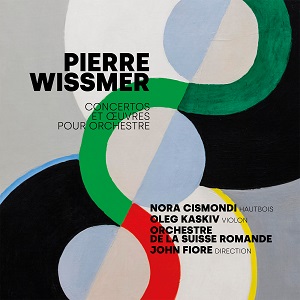Der Schweizer Komponist Pierre Wissmer (1915-1992) komponierte mit L’Enfant et la Rose ein wunderbar lebendiges, farbiges Werk. Programmatisch ist es eine Serie von zwölf Variationen zu Saint-Exupérys Der kleine Prinz, dem der Komponist das Zitat « Man sieht nur mit dem Herzen gut, das Wesentliche ist für die Augen unsichtbar » voranstellte. Eine erste Reihe von fünf Variationen illustriert die Episoden mit den Schafen, den Planeten, der Blume und dem Dialog mit der Schlange.
Ein Intermezzo, ‘Auf der Suche nach den Menschen’, führt zur zweiten Reihe von Variationen, mit den Episoden des Rosengartens, des Fuchses, der Suche nach einem Brunnen, des Brunnens, der singt, dann der Trennung von dem Piloten, dem erneuten Gespräch mit der Schlange, der Rückkehr des Fliegers und dem Tod des kleinen Prinzen.
Der fantasievolle Charme der 1961 von Paul Kletzki uraufgeführten Komposition ist hinreißend und kommt in dieser prächtigen Interpretation voll zum Tragen.
Mit einem kontrastreichen Allegro, einem wunderbar lyrischen Andante und einem lustigen Finalsatz ist das Oboenkonzert ein nicht weniger bezauberndes Werk, in dem die französische Oboistin Nora Cismindi brilliert.
Der 1978 in der Ukraine geborene Geiger Oleg Kaskiv spielt das gleichermaßen interessante Violinkonzert mit viel Raffinement.
Das letzte Werk der CD ist Clamavi, ein symphonisches Triptychon, das auf dem lutherischen Choral ‘Herr, nun lass in Frieden’ beruht. Jedem der drei Teile ist ein biblischer Vers vorangestellt. Im ersten, rhythmisch kraftvollen und dunkel gefärbten Satz ist das « Weh aber der Erde und dem Meer! Denn der Teufel kam zu euch hinab und hat einen großen Zorn und weiß, dass er wenig Zeit hat. » (Offenbarung XII. 12). Vor dem zweiten Satz, einem lyrischen Adagio, steht « Eure Sanftmut lasst alle Menschen erfahren! » (Philipper IV. 5). Das Finale ist freudig bewegt, laut dem Motto « Fürchte dich nicht, liebes Land, sondern freue dich und sei fröhlich, denn der Herr hat Großes getan » (Joel II. 21). In diesem Stück wie auch im übrigen Programm bietet das Orchestre de la Suisse Romande unter dem inspiriert dirigierenden John Fiore tadellose Leistungen, die Wissmers Musik die Qualität geben, die sie verdient.
L’Enfant et la Rose by Swiss composer Pierre Wissmer (1915-1992) is a wonderfully lively, colorful work. Programmatically, it is a series of twelve variations on Saint-Exupéry’s The Little Prince, to which the composer prefaced the quotation « One sees well only with the heart, the essential is invisible to the eyes. » A first set of five variations illustrates the episodes with the sheep, the planets, the flower and the dialogue with the snake.
An intermezzo, ‘In Search of the People,’ leads to the second series of variations, with the episodes of the rose garden, the fox, the search for a fountain, the fountain that sings, then the separation from the pilot, the renewed dialogue with the snake, the return of the aviator and the death of the little prince.
The imaginative charm of the composition, first performed by Paul Kletzki in 1961, is ravishing, and is fully appreciated in this splendid interpretation.
With a contrasting Allegro, a wonderfully lyrical Andante and a fun final movement, the Oboe Concerto is no less enchanting a work in which French oboist Nora Cismindi shines.
Violinist Oleg Kaskiv, born in Ukraine in 1978, plays the equally interesting Violin Concerto with great refinement.
The final work on the CD is Clamavi, a symphonic triptych based on the Lutheran chorale ‘Lord, now let in peace.’ Each of the three parts is prefaced by a biblical verse. In the first, rhythmically powerful and darkly colored movement, the « Woe to the earth, and to the sea, because the devil is come down unto you, having great wrath, knowing that he has but a short time. » (Revelation XII. 12). Before the second movement, a lyrical adagio, there is « Let your gentleness be evident to all! » (Philippians IV. 5). The finale is joyfully moving, according to the motto « Fear not, O land, but be glad, and rejoice: for the Lord will do great things (Joel II. 21). In this piece, as in the rest of the program, the Orchestre de la Suisse Romande under the inspired conducting of John Fiore gives impeccable performances that give Wissmer’s music the quality it deserves.
https://www.pizzicato.lu/eloquent-elegante-musik-von-pierre-wissmer/




















